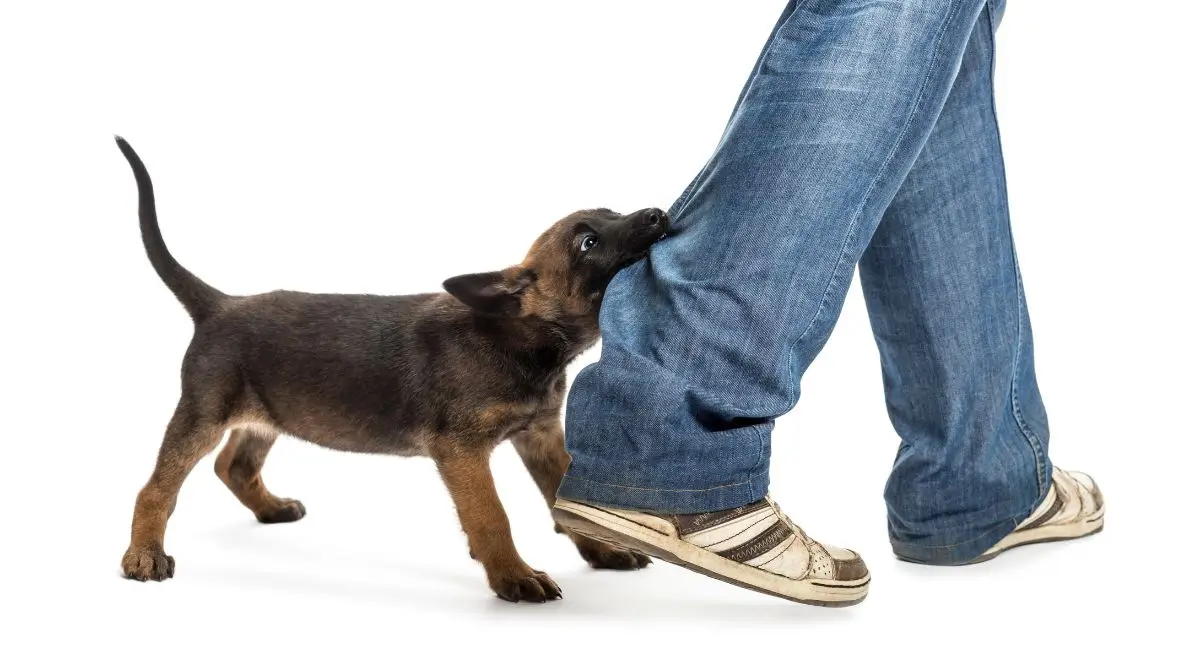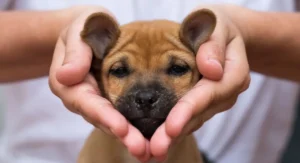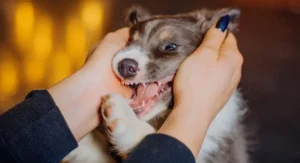When you first brought home your adorable new puppy, you were greeted with a rude surprise, a sharp, persistent bite on your hand that was not so welcome. As a first-time puppy owner, this is an all too common scenario for many, and it’s often followed by questions like “Why won’t my puppy stop biting me?” and “What am I doing wrong?” If you’ve found yourself in this situation, rest assured you’re not alone.
In this guide, we’ll tackle puppies’ biting behavior head-on, offering insights and advanced techniques to help you navigate through this challenging phase with your furry friend. Let’s dive in and end the “my puppy won’t stop biting me” dilemma once and for all.
Identifying The Causes Of Puppy Biting
Why Do Puppies Bite?
The act of biting a puppy is a natural instinct of a puppy, which is an essential part of his development. There are several reasons for puppies to bite:
- Teething – As with babies, puppies undergo a teething phase whereby they chew on things to relieve sore gums, just as humans do with their baby teeth.
- Play Behavior – When puppies bite, they often mimic the wrestling and chasing behaviors seen among their littermates, which mimics the biting behavior of their parents.
- Exploration – When puppies are puppies, they explore the world with their mouths. Exploratory biting is a way that puppies understand the world in which they live.
Normal Vs. Problematic Biting
Despite the fact that some biting is normal, distinguishing between the typical teething and the problematic biting is very important:
- Normal teething – There is a tendency for the puppy to experience this discomfort during the teething phase, which gradually decreases with age.
- Aggressive biting – It is important to be aware that if the biting becomes aggressive or doesn’t decrease over time, it might indicate underlying issues that need to be addressed.
Case Study
A Golden Retriever 5-months-old, Bell, persistently bit her owners during play, causing concerns. Within a month, Bella’s biting significantly decreased after she was redirected to appropriate toys, received consistent positive reinforcement, and received teething toys.
The Common Training Methods And Their Failures
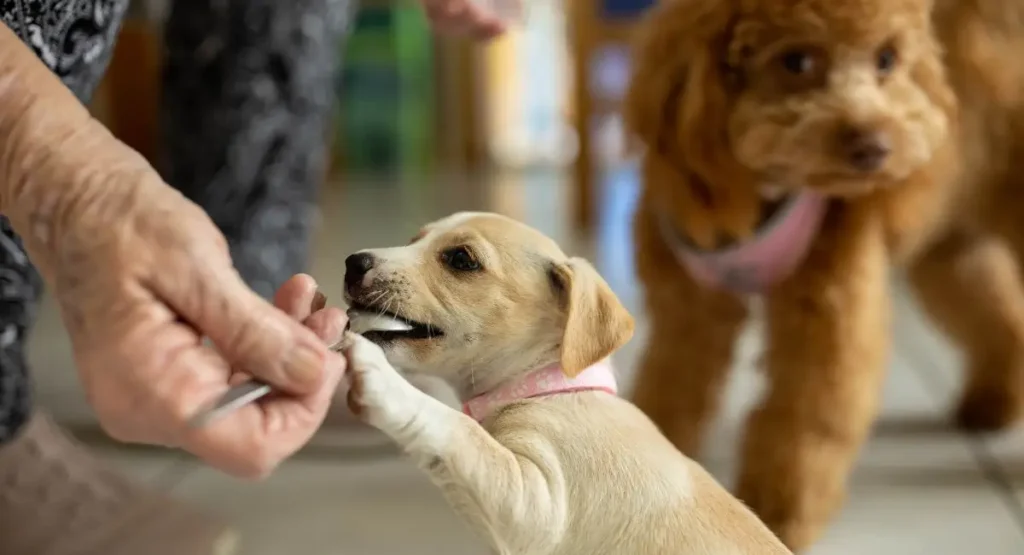
Techniques For Basic Training
- Redirection – When the puppy bites at you, offer a toy or chew to distract him.
- Positive Reinforcement – Positive behavior can be rewarded with treats or praise by rewarding it with treats.
- Time-Outs – Puppy time-outs after a puppy bites in order to teach the puppy consequences for doing so.
The Reasons Behind Failure
There are times when these basic techniques may not work because of a number of different reasons.
- Temperament – As puppies mature, they can develop strong personalities, which require a different approach in order to work properly.
- Environment – It is possible that biting behavior can be aggravated by a stimulating or stressful environment.
- Consistency Issues – When puppies are trained inconsistently, they may be confused, making them unable to learn the necessary skills.
Expert Insights
Dr. Emily Johnson, a renowned dog behaviorist, says:
“Understanding each puppy’s unique needs is crucial. What works for one may not work for another, so flexibility in training methods is key.”
How To Stop Puppy Biting With Advanced Techniques
Adjustment Of Behavior
You will significantly reduce the amount of biting that your puppy experiences by adjusting his or her environment and routine.
- Structured Playtime – Put together regular playtimes so that they can channel their energy in a more constructive way.
- Calm Environment – Make the environment as calm as possible and devoid of excessive stimuli to ensure relaxation.
- Consistent Routine – Make sure you maintain a consistent routine at all times in order to provide stability and predictability to your life.
Toys And Tools That Are Interactive
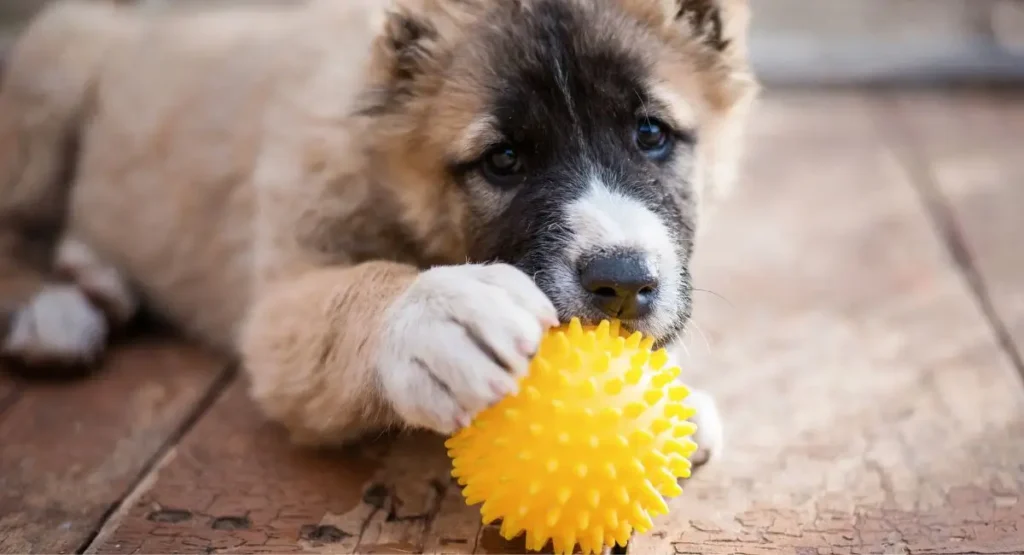
You can prevent biting by investing in toys that are specifically designed for this purpose:
- Chew Toys – Pets can chew on these toys vigorously without harming them.
- Puzzle Toys – Provide mental stimulation for the puppy and keep him away from biting.
- Teething Toys – These toys have been designed with special attention to soothe sore gums during the teething process.
Professional Training Options
Professional trainers or behaviorists may be necessary in certain situations:
- Behavioral Therapy – Behavioral Therapy programs are tailored to address a specific problem associated with biting.
- Group Classes – Classes in which students are given the opportunity to socialize and learn in a controlled environment.
- One-to-One Sessions – Provides you with customized training to address the specific problems you are facing as a practitioner.
Identifying The Underlying Causes
Anxiety About Health
There are a number of health issues that can be indicated by excessive biting.
- Dental Problems – Check for dental issues causing discomfort.
- Allergies – Allergies can cause irritation, leading to biting.
- Anxiety – Stress can manifest itself as aggressive biting.
Providing Mental Stimulation
It is essential to keep your puppy mentally engaged at all times.
- Interactive Games – Play games that challenge their minds.
- Training Sessions – Incorporate short, frequent training sessions.
- Exploration Activities – Allow them to explore their own environments safely.
Getting Socialized
It has been proven that proper socialization reduces biting in the following ways:
- Puppy Playdates – Arrange playdates with other vaccinated puppies.
- Exposure to Different People – Introduce your puppy to various people.
- Controlled Environments – Supervised interactions to ensure positive experiences.
Real-Life Solutions And Success Stories
User Testimonials
Bella’s Story
“Implementing redirection and positive reinforcement helped Bella reduce her biting within a month”
Max’s Story
“Feeding Max in a separate space and using a “gentle” command taught him calm behavior during meal times”
Luna’s Story
“Desensitization training and building trust with Luna, a rescue dog, successfully reduced her nervous bites”
How To Prevent Future Bites
Observing And Adjusting
Keep track of your puppy’s behavior and adjust as necessary.
- Behavior Journals – Maintain a journal to note progress and setbacks.
- Regular Vet Check-Ups – Ensure no underlying health issues.
- Flexibility in training – Be flexible and willing to adjust training methods.
Conclusion
In conclusion, puppy biting is a common challenge for new puppy owners, but with patience and the right techniques, it can be managed effectively. You can help your puppy develop better behavior by understanding why he bites, applying advanced training methods, and addressing his underlying issues if you employ these methods. Puppy biters are unique, and what works for one puppy may not work for another. You should remain consistent, be patient, and seek professional guidance if you need it.
Let me know if you have found these tips helpful. If you have any questions or concerns, you can reach out to a professional if necessary. Together, we can build a supportive community of well-behaved, happy pups.
Frequently Asked Questions
How Do I Stop My Uncontrollable Puppy From Biting?
When a puppy becomes uncontrolled and starts biting, it is important to redirect him or her, reinforce him or her with positive reinforcement, and be consistent in training. If needed, get help from a professional dog trainer.
At What Age Do Puppies Stop Biting?
The majority of puppies stop biting when they finish their teething, which usually happens around 6-7 months of age. However, ongoing training and socialization are essential to ensure they outgrow this behavior as quickly as possible.
How Do You Discipline A Biting Puppy?
A biting puppy should be disciplined with positive reinforcement for positive behavior and time-outs or redirection when they bite. Avoid physical punishment in order to prevent the behavior from worsening.
Why Is My Puppy Biting Me Constantly?
A puppy that bites excessively may be teething, lacking mental stimulation, or being anxious. Be sure your puppy has an environment that is calm, chew toys, and mental stimulation.
How To Teach Your Puppy Not To Bite?
The best way to teach your puppy not to bite by using consistent training techniques like redirecting him to toys, rewarding him for good behavior, and time-outs when he bites is to use consistent training techniques.
Should I Ignore Puppy Bites?
Puppy bites can sometimes be reduced by ignoring them. However, they need to be combined with other training techniques like redirection and positive reinforcement to yield the best results.
Recommended Articles

